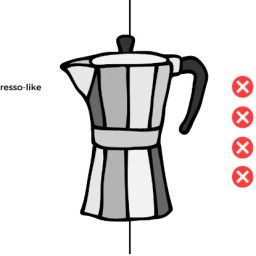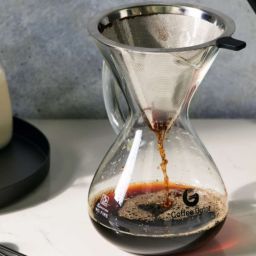
Single serve coffee creamers, whether in liquid or powdered form, are popular for their convenience and variety of flavors. They come in small packages, ideal for one-time use, ensuring your coffee always tastes fresh without the worry of opening a large container that might not be used quickly.
Keeping track of the expiration dates on single serve coffee creamers is crucial. While they are designed for longer shelf life, improper storage or overlooking expiration can lead to spoiled creamers that could ruin your coffee and potentially harm your health.
Key Takeaways
- Expiration vs. Best Before Dates: It’s important to differentiate between “expiration” and “best before” dates. The former indicates when a product might begin to deteriorate in quality or safety, while the latter suggests when it might start to lose its peak quality but remain safe to consume.
- Storage Tips to Extend Shelf Life: To maximize the shelf life of your coffee creamers, store them in a cool, dry place, and keep them away from direct sunlight. For liquid creamers, once opened, refrigerate and tightly seal them to maintain freshness.
- Signs Your Coffee Creamer Has Gone Bad: Be on the lookout for signs of spoilage such as clumps, off smells, or any change in texture. These are clear indicators that your coffee creamer has gone bad and should not be used.
Types of Single Serve Coffee Creamers
Single serve coffee creamers come in both dairy and non-dairy varieties, each catering to different dietary preferences and needs. Dairy creamers are made from real milk or cream, providing a rich and smooth texture. They are favored for their natural taste but are not suitable for those lactose intolerant or vegan.
Non-dairy creamers, on the other hand, are typically made from vegetable oils, and can include coconut, almond, or soy bases. They offer a lactose-free alternative and often come in a variety of flavors. While they can mimic the creaminess of dairy, they might have a slightly different taste and texture due to their plant-based ingredients.
Shelf-Stable vs. Refrigerated Creamers
The choice between shelf-stable and refrigerated single serve coffee creamers depends on your storage capabilities and preference for freshness. Shelf-stable creamers are processed to stay fresh without refrigeration until opened, making them perfect for on-the-go use or in environments without a fridge.
Refrigerated creamers, though, are typically fresher and must be kept cold. They are often preferred by those looking for a taste closer to fresh milk or cream. It’s important to note that once a refrigerated creamer is opened, it should be consumed within a week to maintain its best quality, whereas shelf-stable varieties might last a bit longer after opening when kept refrigerated.
Proper Storage Methods for Maximizing Shelf Life
Storing your single serve coffee creamers correctly is key to ensuring they remain fresh and flavorful. For shelf-stable creamers, keep them in a cool, dry place away from direct sunlight. This helps prevent degradation of the product before its time. Once opened, if the creamer is not consumed immediately, refrigeration is necessary to extend its freshness.
For refrigerated creamers, as the name suggests, keep them in the fridge at all times. It’s essential to ensure that your fridge temperature is set correctly, ideally between 34°F and 38°F (1°C to 3°C). Keeping them at a consistent temperature helps maintain their quality.
Tips for Handling Opened and Unopened Creamers
Unopened shelf-stable creamers are more forgiving about storage conditions, but once opened, they should be treated as perishable goods. Always seal them tightly to avoid exposure to air, which can accelerate spoilage. Opened refrigerated creamers should be used within 7-10 days for optimal freshness and safety.
Signs of Spoilage in Coffee Creamers
The first sign of spoilage in coffee creamers can often be detected by a change in appearance. If you notice any discoloration or separation of the creamer, it’s likely no longer good. Texturally, if the creamer becomes chunky or develops lumps, it should be discarded.
Smell is another critical indicator. Any off odors, sour or rancid smells are clear signs that the creamer has gone bad. Trust your nose; if something smells off, it’s best not to use it.
Health Risks Associated with Consuming Spoiled Creamers
Using spoiled coffee creamers can lead to foodborne illnesses. Symptoms can include stomach discomfort, nausea, and vomiting. To avoid health risks, it’s crucial to adhere to storage guidelines and use your senses to detect spoilage. Always err on the side of caution and dispose of any creamer that shows signs of going bad.
FAQs
Can You Use Single Serve Coffee Creamers After the Expiration Date?
It’s generally not recommended to use single serve coffee creamers after their expiration date. While some non-dairy, shelf-stable creamers might seem okay, the risk of spoilage increases past the listed date. For the best taste and safety, it’s wise to adhere to the expiration dates provided.
How Long Do Non-Dairy Creamers Last Once Opened?
Once opened, non-dairy creamers should be used within 1-2 weeks if kept refrigerated. Even though they are more stable than dairy creamers, keeping them too long after opening can lead to degradation in quality and safety.
Do Coffee Creamers Need to Be Refrigerated?
Shelf-stable creamers do not need to be refrigerated until opened. Once opened, they should be refrigerated and tightly sealed to maintain freshness. Refrigerated creamers, as expected, should always be kept in the fridge.
Final Thoughts
Understanding the types, storage, and spoilage signs of single serve coffee creamers is essential for enjoying your coffee safely and deliciously. Remember, dairy and non-dairy creamers have different shelf lives, and proper storage is key to extending these times.
Always store your coffee creamers according to their type. Refrigerate opened creamers to maintain freshness, and always check for signs of spoilage before use. Adhering to expiration dates is crucial for both safety and quality. With these practices, you can enjoy your coffee at its best every time.









